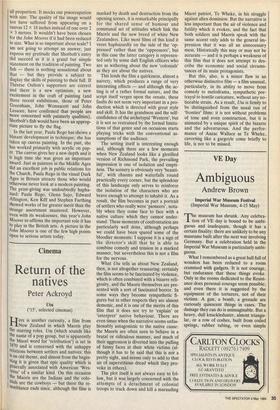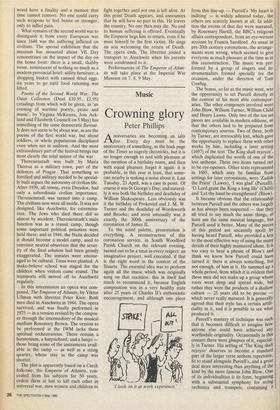YE Day
Ambiguous
Andrew Brown
Imperial War Museum Festival (Imperial War Museum, 4-15 May)
The museum has shrunk. Any celebra- tion of VE day is bound to be ambi- guous and inadequate, though it has a certain finality: there are unlikely to be any museums built after the next war involving Germany. But a celebration held in the Imperial War Museum is particularly ambi- guous.
What I remembered as a great hall full of wonders has been reduced to a room crammed with gadgets. It is not courage, but endurance that these things evoke. Only in the rooms dedicated to the Resist- ance does personal courage seem possible; and even there it is suggested by the equipment of the torturers, not of their victims. A gun, a bomb, a grenade are curiously quiescent things in cases. The damage they can do is unimaginable. But a heavy, dull knuckleduster, almost triangu- lar, or a row of coshes, built from coiled springs, rubber tubing, or even simple wood have a finality and a menace that time cannot remove. No one could carry such weapons to feel better or stronger; only to inflict pain.
What remains of the second world war to distinguish it from every European war since 1648 was the suffering inflicted on civilians. The special exhibition that the museum has mounted about VE Day concentrates on the impact of the day on the home front: there is a small, shabby room, reminiscent of nothing so much as a modern provincial hotel: utility furniture; a shopping basket with canned dried eggs; six years to go until food rationing was lifted.
Poems of the Second World War: The Oasis Collection (Dent 00.95, £3.95) (readings from which will be given, in 'an evening of wartime poetry, prose and music', by Virginia McKenna, Joss Ack- land and Elizabeth Counsell on 5 May) has something of the same democratic flavour. It does not seem to be about war, as are the poems of the first world war, but about soldiers, or whole populations disciplined even when not in uniform. And the most extraordinary part of the festival brings out most clearly the total nature of the war.
Theresienstadt was built by Maria Theresa as a military town, part of the defences of Prague. That something so fortified and military needed to be special- ly built argues the autonomy of civilian life. After 1939, all towns, even Dresden, had only a subordinate civilian importance. 'Theresienstadt was turned into a camp. The civilians now were all inside. It was not designed, like Auschwitz, for extermina- tion. The Jews who died there did so almost by accident. Theresienstadt's main function was as a transit camp, though some important political prisoners were held there; and in 1944, the Nazis decided it should become a model camp, used to convince neutral observers that the sever- ity of the final solution had been grossly exaggerated. The inmates were encour- aged to be cultural. Trees were planted. A make-believe school was staged for the children when visitors came round. The transports still moved off to Auschwitz regularly.
In this intermission an opera was com- posed, The Emperor of Atlantis, by Viktor Ullman with librettist Peter Kien. Both men died in Auschwitz in 1944. The opera survived, and was finally performed in 1975— in a version revised by the compos- er through the intermediary of the musical medium Rosemary Brown. The version to be performed at the IWM lacks these spiritual orchestrations. There remain a harmonium, a harpsichord, and a banjo — those being some of the instruments avail- able in the camp — as well as a string quartet, whose stay in the camp was shorter.
The plot is apparently based on a Czech folk-tale: the Emperor of Atlantis, con- cealed from his subjects for 50 years, orders them at last to kill each other in universal war, men women and children to fight together until not one is left alive. At this point Death appears, and announces that he will have no part in this. He leaves the country. No one then may die. No end to human suffering is offered. Eventually the Emperor begs him to return, even if he must himself be the first victim. He sings an aria welcoming the return of Death. The opera ends. The librettist joined a transport to Auschwitz when his parents were condemned to it.
Performances of The Emperor of Atlan- tis will take place at the Imperial War Museum on 7, 8, 9 May.



















































 Previous page
Previous page